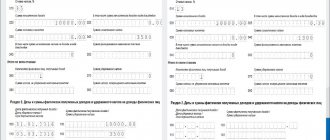Home » Assignment » Tax on assignment of rights to an apartment
March 03, 2021 No comments
The assignment of the right of claim is a legal mechanism that allows you to change the buyer of the apartment in the agreement for shared participation in construction.
It differs from a purchase and sale agreement for a real estate property, since with a standard sale, an apartment building must already be erected and put into operation, and the apartment must have an extract from the Unified State Register of Real Estate, but the shareholder does not yet have it.
But he can cede to the new acquirer the right to claim housing within a specified period from the developer.
Buying an apartment through assignment is beneficial for buyers in that they can purchase suitable housing at a low cost. Such a deal is also beneficial for shareholders, because allows you to return money for the property, and in some cases, receive income.
Assignment of claims between individuals is not always subject to personal income tax
When a creditor (assignor) gratuitously assigns the rights of claim to a new creditor under a loan agreement, the individual assignor does not generate income subject to personal income tax.
This conclusion is contained in the letter of the Department of Tax and Customs Policy of the Ministry of Finance of Russia dated July 10, 2021 No. 03-04-06/47916 “On the calculation of personal income tax when an individual cedes the rights of claim under a loan agreement to an organization to another individual.” At the same time, an individual – a new creditor – receives income subject to personal income tax when the debtor organization repays the debt under the loan agreement, including the debt to pay interest on the loan. The tax must be calculated, withheld, and transferred to the budget by an organization recognized as a tax agent for personal income tax (clause 1 of Article 226 of the Tax Code). Financiers noted that income received from the gratuitous assignment of claims under a loan agreement made between individuals is exempt from personal income tax on the basis of clause 18.1 of Art. 217 Tax Code of the Russian Federation. Let us recall that, according to this norm, income in cash or in kind received by an individual as a gift is exempt from personal income tax.
Does a personal income tax taxpayer have the right to reduce income from the sale of property for expenses such as finishing work, installation of gas and plumbing equipment, as well as the cost of paying for the services of a realtor and notary? Find out from the material “Reducing, for personal income tax purposes, income from the sale of property by the amount of expenses associated with the acquisition of this property” in the “Encyclopedia of Solutions. Taxes and contributions" Internet version of the GARANT system. Get full access for 3 days for free!
The department indicated that the right of claim under a loan agreement received through a gratuitous assignment will be recognized as a gift if certain conditions are met (clause 3 of Article 576 of the Civil Code). For example, the assignment of a claim based on a transaction concluded in simple written or notarial form must be made in appropriate written form (clause 1 of Article 389 of the Civil Code of the Russian Federation).
However, as a general rule, when the assignor (creditor) assigns the rights of claim to another person (assignee), the individual assignor receives income in the amount of funds received from the assignee, subject to personal income tax, if such an operation was carried out on a reimbursable basis.
Taxation of penalties under Federal Law-214 from the developer
If the developer delayed the delivery of the property and the court ordered him to pay a penalty, tax is also withheld from it. The penalty collected by the shareholder from the construction organization and actually received (i.e., according to actually executed executive documents) is subject to personal income tax on a general basis.
The developer, at the same time, acts as a tax agent, obligated to withhold personal income tax on his own and bring it into the budget. This usually happens when the amount of personal income tax for each shareholder is directly established by the court.
If the amount of tax is not determined in the court decision, the developer notifies the taxpayer and the inspectorate of the impossibility of withholding the tax and invites the shareholder to file a declaration and pay personal income tax independently.
Calculator for calculating penalties under 214-FZ:
In general, the following rules have been formed in judicial practice regarding the payment of personal income tax from funds received by the shareholder under a writ of execution.
- Taxed at 13%:
- Tax for penalty under DDU for delay in transfer of property;
- Tax on the fine for failure to voluntarily repay the penalty;
- Personal income tax on the amount under the settlement agreement.
- Not taxed:
- Losses for renting an apartment during the delay in delivery of a new building;
- The difference in mortgage interest paid in connection with waiting for completion of construction beyond the deadlines specified in the DDU;
- Moral injury;
- Costs for a notary (power of attorney), lawyer, court costs.
Important: Those parts of income that compensate for the real damage of the shareholder are not taxed. Penalties and fines are subject to personal income tax, since they are punitive in nature for the developer; they are intended to compensate for lost profits in the sense of Art. 15 Civil Code of the Russian Federation .
However, judicial practice on this issue is different. This fact very much depends on the region in which the trial took place and often requires additional advice from a lawyer in a specific subject of the Russian Federation,
Some courts support the opinion of the Federal Tax Service and the Ministry of Finance, which argue that penalties and fines clearly provide economic benefit to the injured party, which is equivalent to income. There are authorities that do not consider penalties as income subject to taxation. Since payments from the developer are in the nature of compensation for material and moral losses and are compensatory, this means they are not subject to taxation under the Law “On the Protection of Consumer Rights”.
Pay personal income tax or defend the right not to pay tax on penalties in court? It is better to look for the answer to this question in the judicial practice of your region.
Comments and opinions
It would seem a rather trivial question: who will be the tax agent when paying income to an individual? Whoever pays will be the one who pays. Here is the Ministry of Finance of Russia in letter dated November 12, 2018 No. 03-04-06/81186
thinks so.
But in fact, the problem is much, much deeper. And officials know this very well. But contrary to their own “solemn oath” in letters from the Federal Tax Service of Russia dated November 26, 2013 No. GD-4-3/21097 and the Ministry of Finance of Russia dated November 7, 2013 No. 03-01-13/01/47571, they stubbornly refuse to comply with the decisions of not only the Armed Forces of the Russian Federation, but even the Constitutional Court of the Russian Federation!
So, what's the matter? Let us assume that a citizen has acquired from a creditor company its right of claim against the debtor under a loan agreement. (To simplify the example, we will consider the loan interest-free). Then the citizen received a loan amount from the debtor in the amount of, say, 100,000 rubles.
How does the Ministry of Finance view this situation?
In accordance with paragraph 1 of Art. 210 of the Tax Code of the Russian Federation, when determining the tax base, all income of the taxpayer received by him, both in cash and in kind, or the right to dispose of which he has acquired, as well as income in the form of material benefits, determined in accordance with Art. 212 of the Tax Code of the Russian Federation. At the same time, according to Art. 41 of the Tax Code of the Russian Federation, income is recognized as an economic benefit in cash or in kind, taken into account if it is possible to evaluate it and to the extent that such benefit can be assessed, and determined for the purposes of paying personal income tax in accordance with Chapter 23 of the Tax Code of the Russian Federation.
When the creditor assigns the rights of claim to another person, the income of the individual - the new creditor arises when the debtor repays the debt under the loan agreement, including the debt to pay interest on the loan. Tax on income paid by the debtor to an individual - a new creditor - is calculated and paid by the said debtor, recognized on the basis of clause 1 of Art. 226 of the Tax Code of the Russian Federation as a tax agent.
When receiving income in cash, the date of actual receipt of income is determined in accordance with paragraphs. 1 clause 1 art. 223 of the Tax Code of the Russian Federation as the day of payment of income.
At the same time, the situation, according to the Russian Ministry of Finance, looks like this. A citizen receives 100,000 rubles and must pay 13,000 rubles in personal income tax. What if he paid the original creditor 90,000 rubles for this claim? It turns out that he also received a loss in the amount of 3,000 rubles (100,000 – 13,000 – 90,000)?! But how can that be! After all, a citizen’s economic benefit is only 10,000 rubles (100,000 – 90,000).
“Dura lex sed lex,” the officials answer. Accounting for expenses incurred by the taxpayer when assigning rights of claim is provided for in Chapter. 23 of the Tax Code of the Russian Federation only in paragraphs. 2 p. 2 art. 220 of the Tax Code of the Russian Federation in relation to agreements for participation in shared construction. The possibility for individuals to take into account when determining the tax base of expenses for a transaction of assignment of the right of claim under other agreements in Art. Art. 218 - 220 of the Tax Code of the Russian Federation is not provided for. (See, for example, letter of the Ministry of Finance of Russia dated March 24, 2016 No. 03-04-05/16489).
Assignment of the right of claim under an assignment agreement
Based on the assignment agreement, one of the parties (assignor) transfers to the second party (assignee) the right to claim the debt. The assignment agreement can be drawn up taking into account the following features:
- Paid/free transfer of debt . The creditor may transfer the right to collect debt from the debtor for a fee or on a free basis. In general, an assignment agreement is essentially an agreement for the “purchase and sale of debt” for a fixed price established by the agreement. In rare cases, the right to collect a debt is transferred to a new creditor without payment; in this case, it is recognized as a gift on the basis of Art. 382-386, 388-389 Civil Code of the Russian Federation.
- Tripartite/bilateral agreement. According to the norms of the Civil Code of the Russian Federation, an assignment agreement can be concluded either in a bilateral form (between creditors) or in the form of a tripartite agreement (with the participation of the debtor). Moreover, according to 385 of the Civil Code, a notification to the debtor about the transfer of the right to claim a debt can also be issued in the form of a separate written notice.
Based on para. 2 p. 1 art. 385 of the Labor Code of the Russian Federation, the debtor may not comply with the demands of the new creditor, provided that the latter has not provided documents confirming the assignment of the right of claim.
If the assignment agreement is signed by three parties (assignor, assignee, debtor), then such an agreement serves as confirmation for the debtor of the right to claim the debt by the new creditor. In this case, the assignee does not need to provide any additional documents.
Assignment of rights under the DDU for housing under construction
Assignment of rights occurs when the shareholder bought an apartment under the DDU, and before putting the house into operation, or rather before signing the transfer and acceptance certificate, assigned his rights and obligations to another person. As a result, the new buyer (assignee) will become the owner of the housing under the assignment agreement, he assumes risks and responsibility, and in the event of construction delays or other unfavorable circumstances, the developer, and not the seller (assignor), will be responsible under the agreement.
Most often, developers try to limit the right to assign the DDU agreement, for example, they include requirements for the payment of a commission in the agreement or introduce other restrictions on assignment. These requirements are illegal; it is enough to simply notify the developer of the impending assignment in writing, as with any change of creditor.
Important: It is enough to notify the developer about the assignment of rights under the DDU agreement. But, it is important to know that a unilateral assignment is allowed if the shareholder has fully fulfilled his obligations to pay the rent for the apartment.
If the apartment was purchased using a mortgage loan, then it is important to reach an agreement with the bank, having options: repay its loan, replace the collateral or re-register the mortgage to a new shareholder under the DDU. Unfortunately, in this part you are completely dependent on the bank that financed the transaction.
Is it necessary to obtain the developer’s consent to assign rights under the DDU? You can find out what the legal requirements are in our next article.
Personal income tax upon assignment of the right of claim
Personal income tax upon assignment of the right of claim
In general, the amount of payment transferred by the assignee to the assignor as payment under the agreement is recognized as an object of taxation in accordance with the Tax Code of the Russian Federation.
In cases where the transfer of the right of claim is made between organizations, the income of the assignor is subject to income tax. If income is paid in favor of the assignor-individual, then such income is recognized as subject to personal income tax.
Payment of personal income tax by the assignor
According to the provisions of Art. 209 of the Labor Code of the Russian Federation, the object of personal income tax taxation is the income of individuals received from sources in the territory of the Russian Federation and abroad.
Income under an assignment agreement is recognized as income of an individual in the general manner. Thus, the object of personal income tax taxation arises in cases where the assignor is an individual, regardless of the legal status of the other parties to the transaction.
Calculation of the amount of personal income tax and payment of tax to the budget is the responsibility of the individual recipient of the income. When calculating personal income tax on the amount of income received from the assignment of a claim, a standard rate of 13% is applied.
If the assignor individual transferred the right to claim the debt to a new creditor (legal entity or individual) on a free-of-charge basis, that is, the assignment agreement does not provide for the receipt of income by the assignor, then in this case personal income tax is not charged, since there is no tax base.
Personal income tax on the income of the assignee
Responsibilities for calculating personal income tax upon assignment of the right of claim may also arise in the case where the new creditor (assignee) is an individual. A transaction subject to taxation is the transfer by the debtor of payment to repay the debt, as well as the amount of accrued interest.
Personal income tax when paying a debt in favor of an individual assignee is accrued regardless of whether the payer is an individual or a legal entity. It also does not matter whether the payer paid off the debt in full or transferred a partial payment to pay off the debt.
Upon receipt of payment from the debtor, the assignee-individual calculates tax at a rate of 13% of the amount of actual receipt.
Bank assignment
The assignment agreement in the field of banking services deserves special attention. When concluding a loan agreement between an individual and a bank, sometimes a situation arises that in the process of repaying the loan funds, the borrower encounters financial difficulties and is unable to pay the loan on time and in full, or is not able to pay it at all. The bank, due to its narrow specialization, is not able to direct all its efforts to collecting the debt, and then it turns to a certain entity with an offer to buy the debt for a certain price and on certain conditions. In turn, the debt buyer assumes all rights to collect debt from the debtor client. In this matter, the law has two positions: on the one hand, the state assigns the right to claim the debt exclusively to the bank and apply legislative norms regulating lending, on the other hand, the loan legislation reflected in the Civil Code of the Russian Federation makes it possible to assign the right to claim the debt to a person who does not have powers of the credit institution. Therefore, such issues are resolved in court, taking into account the individuality of the situation.
The well-known proverb about the draw very accurately reflects the essence of the legal inconsistencies that arise when implementing an assignment agreement in the process of interaction between individuals. Despite this, compliance with the law makes it possible to simplify the process involving a loan as much as possible and eliminate controversial issues. And the assignment in this aspect should be considered as a very useful civil law transaction regulating the debt relations of individuals.
On the calculation of personal income tax when an individual cedes the right to claim a debt under a loan agreement to a third party
Question: I ask you to provide clarification on the issue of calculation and payment of personal income tax by an individual under a transaction of assignment of rights of claim (assignment).
I, an individual, provided a loan to a legal entity. Without waiting for repayment, the right to claim the debt under a loan agreement with a legal entity was assigned by me to another legal entity.
Please provide clarification on the legality of the following approach when determining the tax base for personal income tax when receiving income under an assignment agreement: according to Article 382 of the Civil Code of the Russian Federation, the right (claim) belonging to the creditor on the basis of an obligation can be transferred by him to another person under a transaction (assignment of the claim) or transfer to another person on the basis of law.
The assignment of the right of claim represents a change in the person (party) in the obligation, but does not change the subject of the obligation.
In accordance with Article 210 of the Tax Code of the Russian Federation, when determining the tax base, all income of the taxpayer received by him both in cash and in kind or the right to dispose of which he has acquired, as well as income in the form of material benefits, are taken into account.
Article 41 of the Tax Code of the Russian Federation stipulates that income is recognized as an economic benefit in monetary or in-kind form, taken into account if it is possible to assess it and to the extent that such benefit can be assessed, and determined for the purposes of calculating personal income tax in accordance with the chapters “Tax” on the income of individuals”, “Organizational income tax” of the Code.
In connection with the above, I believe that the tax base for calculating personal income tax is the amount of income received by an individual under an agreement for the assignment of the right to claim a debt, reduced by the amount of actually incurred and documented expenses for payments made as part of the provision of a loan under the agreement.
Please clarify whether in this case the correct approach to forming the tax base for the income tax of an individual received under an agreement of assignment of the right to claim a debt.
Ministry of Finance of the Russian Federation DEPARTMENT OF TAX AND CUSTOMS TARIFF POLICY LETTER dated June 10, 2014 N 03-04-05/27970 [On the calculation of personal income tax upon assignment of the right of claim under a loan agreement to a third party]
The Department of Tax and Customs Tariff Policy considered the appeal on the issue of calculating personal income tax when assigning the right of claim under a loan agreement to a third party and, in accordance with Article 34_2 of the Tax Code of the Russian Federation (hereinafter referred to as the Code), explains the following.
In accordance with paragraphs 1 and 3 of Article 210 of the Code, when determining the tax base, all income of the taxpayer received by him both in cash and in kind, or the right to dispose of which he has acquired, as well as income in the form of material benefits, defined in in accordance with Article 212 of the Code, with the use in established cases of tax deductions provided for in Articles 218-221 of the Code.
At the same time, according to Article 41 of the Code, income is recognized as an economic benefit in monetary or in-kind form, taken into account if it is possible to evaluate it and to the extent that such benefit can be assessed, and determined for the purposes of paying personal income tax in accordance with the chapter “Tax” on the income of individuals" of the Code.
According to subparagraph 1 of paragraph 1 of Article 220 of the Code, accounting for expenses incurred by the taxpayer upon assignment of rights of claim is provided only in relation to agreements for participation in shared construction (investment agreements for shared construction or under other agreements related to shared construction).
Accounting for any expenses when making a transaction of assignment of the right of claim under a loan agreement in order to determine the tax base by an individual - creditor when he receives income in the form of cash. received from a new creditor is not provided for in Articles 218-221 of the Code.
The amount of money received by a taxpayer-creditor under a transaction of assignment of a claim from a new creditor is subject to taxation in the prescribed manner in full.
Registration procedure
To complete a transaction for the assignment of the right of claim to real estate, you must perform the following steps:
- Agree with the buyer. You can find it using an advertisement or through a real estate agency.
- After which you need to send a written notification to the developer or obtain written consent from him.
- If the investor used mortgage funds to pay for the apartment, then you need to contact the bank. Documents must be submitted to the institution that confirm the financial condition of the buyer of the rights.
- After the bank’s specialists assess the buyer’s solvency, the mortgage loan is closed and a new one is issued, to which the acquirer of the right of claim is a party.
The next stage is the conclusion of the deal. Typically, most of its clauses correspond to the terms of the equity participation agreement. The assignment agreement also specifies the obligations of 3 parties (seller, acquirer and construction company).
To prepare the text of the contract, it is advisable to seek the services of a competent lawyer. Correct drafting of the document will help prevent mistakes that could lead to the invalidity of the contract.
List of required documents
To carry out the procedure for registering an assignment transaction and comply with the requirements of its legality, you will need to attach the following papers:
- Main share participation agreement;
- preliminary agreement;
- receipts confirming payment;
- directly the contract of assignment of the right of claim.
Resale of debt by an individual: how to pay personal income tax
Is it possible to take into account the costs of purchasing debt?
At the time of purchasing the organization's receivables, you do not have any income or any personal income tax obligations. But in the future, if you resell this debt or if the debtor organization whose debt you acquired pays it off, you will need to pay personal income tax on the income received under clause 1 of Art. 210 Tax Code of the Russian Federation.
The question is, is it possible to reduce the income from the sale of debt by the costs of purchasing it? At first glance, the answer is obvious: of course, yes! But it's not that simple.
Position 1. You cannot take into account the costs of purchasing debt.
For a long time, both the Ministry of Finance and the Federal Tax Service thought so. The arguments are as follows: the ability to take into account expenses when assigning rights of claim is expressly provided for by law, but only in relation to agreements for participation in shared construction or under other agreements related to it, sub. 1 clause 1 art. 220 Tax Code of the Russian Federation. That is, the legislator deliberately extended this procedure only to a specific category of transactions for the sale of property rights.








